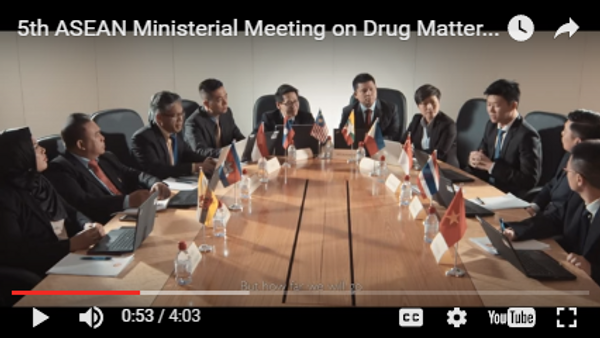Questioning the ‘limits of reality’ – ASEAN reaffirms commitment to become ‘drug-free’
ASEAN Ministers met in Singapore last week at the 5th ASEAN Ministerial Meeting on Drug Matters entitled, “Securing Drug-free Communities for our Future” to agree a new regional 10-year action plan on drugs. Ministers at the meeting reaffirmed the vision of a ‘drug-free’ ASEAN although it seems a new target date for achieving this was not set. Given that the last target date of 2015 was missed, perhaps ASEAN leaders do not want to be held accountable for an unrealistic and increasingly hollow goal.
To celebrate the event, ASEAN released a promotional video on the region’s vision of ‘drug-free communities’.
The message of the video is that the utopian vision of a drug-free society is possible – one where everyone will be safe and secure. In several places, the narrator admits the impossibility of this dream and yet, the film calls on ASEAN to resist reality. Early on, he states, “The question is not whether we will accept the limits of reality, but how far we will go to make our voices heard”. This is followed by a clip of the ASEAN statement at the UNGASS in April 2016 reaffirming the region’s drug-free vision.
Prior to the meeting, IDPC and ANPUD released a media advisory calling on ASEAN Ministers to re-evaluate approaches to drugs and change policies towards improving the health, security and development of all members of society. This re-evaluation is urgent, as drug control in many ASEAN countries has exacted a very high human cost through draconian measures (including compulsory detention, forced urine testing, the death penalty and even extrajudicial killings) that have failed to reduce the scale of the illicit drug trade. IDPC and Asian partners have repeatedly called for civil society to be included in the evaluation of the last ASEAN action plan but these calls have been ignored.
Following last week’s meeting and the release of this video, it is clear that ASEAN leaders have not heeded calls to drop the disastrous ‘drug-free’ rhetoric and continue to endorse damaging policies such as forced treatment, punishment for drug use and pressure on families and communities to report anyone using drugs to the authorities (all messages reinforced in the video).
In addition, both the meeting and the film reject growing calls for drug policy reform. The video frames those calling for legal regulation and decriminalisation as irresponsible, people who “care little about the consequences of their actions”. At the meeting, Singapore warned ASEAN countries against allowing the medical use of certain drugs, and called on them to ensure the region maintains its zero-tolerance approach. Singapore’s Deputy Prime Minister said, “As the global debate on drugs intensifies, what we say as a region will matter”.
Such comments appear directed towards the governments of Thailand and Myanmar to resist current proposals to reform drug laws. These initiatives are led by a recognition that punitive measures have negatively impacted the health of people who use drugs and have overburdened criminal justice systems, while failing to achieve stated ‘drug-free’ aims. It would be a shame if these progressive proposals, which face challenges at the national level, become further stalled by pressure from ASEAN.
It is a travesty that ASEAN leaders are willing to go out of their way to warn any government considering moving away from zero-tolerance approaches, but refuse to speak out against devastating human rights abuses committed in the name of drug control.
The most extreme example is that of President Rodrigo Duterte’s ‘war on drugs’ in the Philippines, which has led to the unlawful killings of more than 4,000 people in the campaign’s first four months in acts of state-sanctioned murder. His contempt for the rule of law and due process has drawn international condemnation and a warning from the chief prosecutor of the International Criminal Court. Yet regional leaders say nothing and blindly repeat irresponsible and disastrously ‘drug-free’ rhetoric that illustrates an unfortunate disregard for protecting human life.
Keep up-to-date with drug policy developments by subscribing to the IDPC Monthly Alert.
Topics
Regions
Related Profiles
- International Drug Policy Consortium (IDPC)
